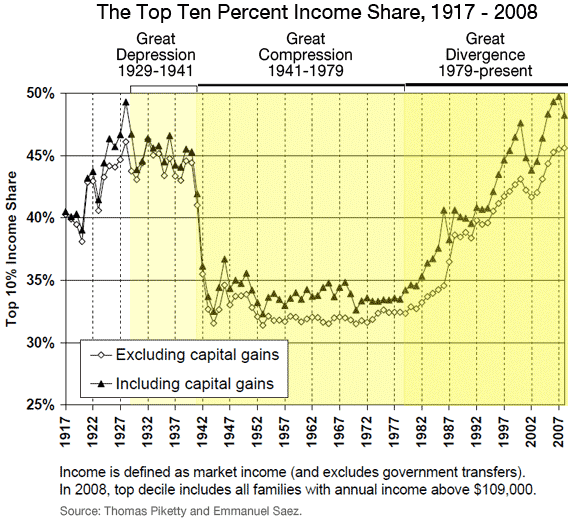Today, the richest 1 percent account for 24 percent of the nation's income.
It's generally understood that we live in a time of growing income inequality, but "the ordinary person is not really aware of how big it is," Krugman told me. During the late 1980s and the late 1990s, the United States experienced two unprecedentedly long periods of sustained economic growth—the "seven fat years" and the "long boom." Yet from 1980 to 2005, more than 80 percent of total increase in Americans' income went to the top 1 percent. Economic growth was more sluggish in the aughts, but the decade saw productivity increase by about 20 percent. Yet virtually none of the increase translated into wage growth at middle and lower incomes, an outcome that left many economists scratching their heads. [Emphasis added].

Why don't Americans pay more attention to growing income disparity? One reason may be our enduring belief in social mobility. Economic inequality is less troubling if you live in a country where any child, no matter how humble his or her origins, can grow up to be president. In a survey of 27 nations conducted from 1998 to 2001, the country where the highest proportion agreed with the statement "people are rewarded for intelligence and skill" was, of course, the United States. (69 percent). But when it comes to real as opposed to imagined social mobility, surveys find less in the United States than in much of (what we consider) the class-bound Old World. France, Germany, Sweden, Denmark, Spain—not to mention some newer nations like Canada and Australia—are all places where your chances of rising from the bottom are better than they are in the land of Horatio Alger's Ragged Dick.
All my life I've heard Latin America described as a failed society (or collection of failed societies) because of its grotesque maldistribution of wealth. Peasants in rags beg for food outside the high walls of opulent villas, and so on. But according to the Central Intelligence Agency (whose patriotism I hesitate to question), income distribution in the United States is more unequal than in Guyana, Nicaragua, and Venezuela, and roughly on par with Uruguay, Argentina, and Ecuador. Income inequality is actually declining in Latin America even as it continues to increase in the United States. Economically speaking, the richest nation on earth is starting to resemble a banana republic.
For much more, see The United States of Inequality by Timothy Noah, September 3, 2010, at Slate.
No comments:
Post a Comment